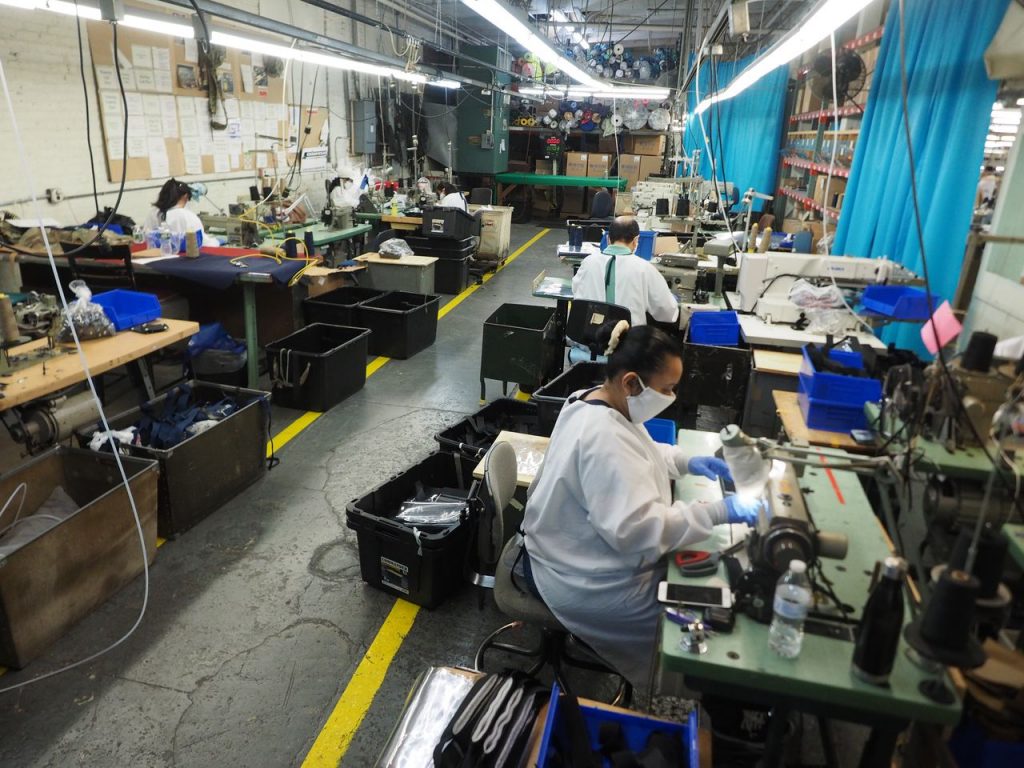
Unionwear CEO Mitch Cahn was recently quoted by Kate Nishimur in the Sourcing Journal about making PPE domestically during the pandemic. Below is an excerpt of that interview; click on the link above for the full article with additional context.
——————-
It’s likely that the term “personal protective equipment,” along with its acronym, PPE, never crossed the lips of most Americans before 2020. But as the pandemic roiled the country’s healthcare sector, these items—masks, face shields and gowns—became more valuable than virtually any other cargo. And the U.S. was deeply and inarguably dependent on China, its trade war adversary, for the millions of products needed to keep front-line workers safe.
A dystopian drama followed, winding its way through metropolitan meccas like New York and Los Angeles and wreaking havoc on small cities and towns. And as doctors, nurses and the American government cried out with an unending—and often, unmet—need for more life-saving gear, a contingent of American producers rose to meet the call.
“It was really just pure survival,” Mitch Cahn, president of New Jersey-based Unionwear told Sourcing Journal of his company’s move into PPE production. The manufacturer, which deals in sports, military and election-related merch like baseball caps, trucker hats, beanies, scarves and backpacks felt the PPE pull in early March, Cahn said, as horror stories about overwhelmed hospitals dominated the media cycle and the company’s usual business dried up.
Unionwear saw orders canceled as spring sporting events were put on hold and even the presidential primary race became second-tier news. “The other business that we had was doing a lot of gear for the census takers,” he added—a lifeline that was cut when the U.S. Census Bureau delayed the nationwide survey for a period of months. The company had also been under contract for merchandise for the U.S. Olympic team, but the games were postponed until 2021. “We went from being way too busy to having nothing to do in like two weeks,” he said.
According to Cahn, his company’s union, Workers United, is affiliated with the Service Employees International Union (SEIU), which represents the nation’s healthcare workers. Having heard about troubles in nearby New York City medical centers, Cahn went through both organizations to reach the Greater New York Hospital Association. “In short order we were making gowns and face shields,” he said. “They knew we could do it, and that we could get FDA waivers for those products—and we hit the ground running and made a lot of them.”
Coincidentally, Unionwear’s capabilities mirror the technical expertise, along with the material and machinery investment, needed to create uber-specific PPE staples like face shields.
“I’d never heard of a face shield and had no idea what it was,” Cahn said, until he was sent a photo by a hospital administrator. The company happens to make three-ring binders, and Cahn immediately recognized the clear plastic as something he already had in his arsenal. “It’s wrapped around every binder that we make,” he said. Meanwhile, the band used to secure the shield around the wearer’s head was similar to the construction of a baseball hat, and the company created a comfortable cushion with the foam used to make its backpack straps. “We had a supply chain already set up for it,” Cahn added, and the company went on to make about 500,000 face shields for doctors across the region, along with hundreds of thousands of gowns.
The company began making face shields with materials from its existing supply chain.
A Unionwear face shield made with materials from its existing supply chain.
The pandemic-driven pivot pulled companies like Unionwear back from the brink, but it also shone a spotlight on the versatility of American producers.
Read more at the link HERE
#PPE #pandemic #business #leadership #innovation

 Union Made In USA
Union Made In USA




